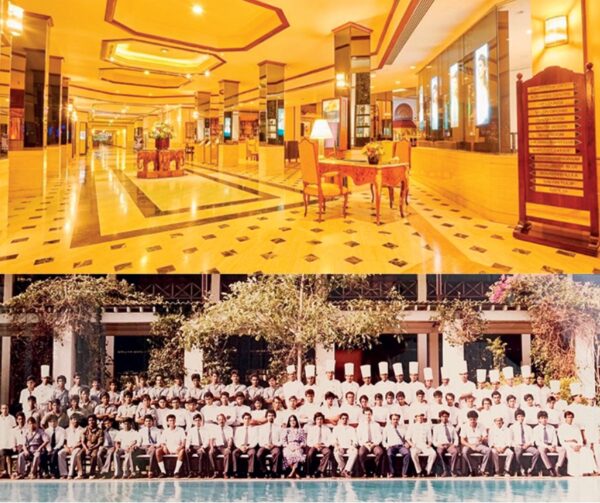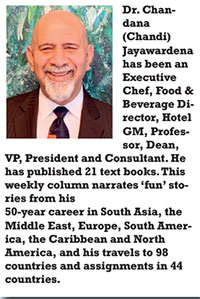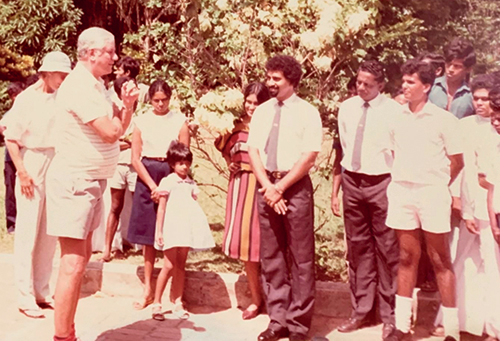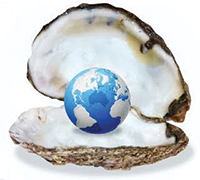From Jungle To International Five-Star

Source:Island
CONFESSIONS OF A GLOBAL GYPSY
Dr. Chandana (Chandi) Jayawardena DPhil
President – Chandi J. Associates Inc. Consulting, Canada
Founder & Administrator – Global Hospitality Forum
chandij@sympatico.ca
Prime Minister’s Village Re-awakening
I first met Ranasinghe Premadasa, the ninth prime minister of Sri Lanka, in 1981. He was a unique man loved by many supporters and hated by many critics. At that time, I was at the John Keells head office as the Manager – Operations of their hotel management and marketing services company. We also managed Temple Trees, the official residence of the Prime Minister and his family. Managing Temple Trees was a demanding contract.
I visited Temple Trees occasionally to support Fazal Izzadeen, a manager whom I transferred from Hotel Swanee to be in charge of the Temple Trees operation. Given the personal friendship my boss, Bobby Adams had with the Prime Minister, the Director – Operation had to be personally involved in managing this prestigious property. A perfectionist, Mr. Premadasa did not tolerate any sub-standard quality in maintenance, upkeep and cleanliness. Fazal did a great job in keeping the second family of Sri Lanka content with the services we provided, and more importantly, off our backs.
Unlike any of his predecessors, Ranasinghe Premadasa came from a family of modest means. Politically a self-made man, he was the first ‘commoner’ to become Prime Minister of Sri Lanka, breaking a 30-year tradition of the top leadership of the country being controlled by the high caste aristocracy coming from affluent families. Educated in a Christian missionary college in Colombo, Mr. Premadasa initially opted for a career as a journalist. He was a prolific writer and an electrifying orator in Sinhala. He had been keenly interested in neighbourhood welfare affairs since his youth. He became increasingly involved in municipal politics, initially as a member of the leftist, Ceylon Labour Party which led to his election to the Colombo Municipal Council at a young age of 26.
One day in early 1986, Bobby Adams entrusted a special duty to me. He called to say, “the Honourable Prime Minister will be staying at the Village, Habarana for five days, while he is busy with the 1986 Gam Udawa (Village Re-awakening) project in nearby Hingurakgoda. As I cannot be there this time, please look after him and his team of 50, including the security detail.”
Between 1979 and until his gruesome assassination by a suicide bomber while organizing a May Day demonstration in 1993, when he was the President of Sri Lanka, Mr. Premadasa led 15 annual Gam Udawa projects in different districts in rural Sri Lanka. The festivals were part of a massive, public housing and development program envisioned by him. The festivals were implemented with great efficiency, for the benefit of poor villagers, and predominantly in Sinhala Buddhist areas. Gam Udawa helped consolidate state ideologies at a time when its political and moral authority was being challenged by insurrectionary and separatist groups.
As the General Manager of the Lodge and the Village, hosting the Prime Minister for five-days was an interesting assignment. It enabled me to see the different facets of a unique personality of our times. Our team did the outdoor catering whenever the Prime Minister went to Hingurakgoda to see the progress of the project. At times, he was ruthless in dealing with the government engineers, project managers and private contractors.
He had no patience for project delays and inefficiencies. Nor did he hesitate to take senior bureaucrats to task, in public, in the presence of their subordinates. Quoting one of his idols, Jawaharlal Nehru (the first Prime Minister of India, whose autobiography was translated into Sinhala by Premadasa), he emphasised that, “I am only interested in work done and not in excuses!”
During the evening at the Village, the Prime Minister was in a more relaxed mood, and I saw a different side of his personality. At times he played football with the resort staff. He was athletic and fit. He had his dinner around 6:00 pm and then walked with our management team on the bund of the Habarana tank. His loyal and influential valet, Mohideen walked behind him with a radio playing Buddhist pirith chanting.
One early evening, during our walk, the Prime Minister looked at my wife who was pregnant, and asked her, “Did you have your dinner?” When she replied that we eat around 9:00 pm, the Prime Minister was unhappy. “In your condition, you should ideally be eating five hours before bed time.” he lectured her.Mr. Premadasa was a hard-working man who commenced his day around 4:00 am. After his early breakfast (usually string hoppers made with healthy, kurakkan (millet) and red rice flour, he would call the cabinet ministers and senior officials. They all knew his early routine and had gotten used to getting up very early to respond to the boss’s calls.

Mr. Premadasa was a big fan of the Singaporean Prime Minister, Lee Kuan Yew and his tough leadership style. He often spoke fondly about how effectively Lee Kuan Yew had developed Singapore to an unprecedented advanced level from a previously poor country which only obtained independence 14 years after Ceylon.On the last day of his visit, we were all waiting by the helipad of the Village Habarana to bid farewell to the Prime Minister. At 8:00 am sharp, he left his suite and said his goodbyes to managers and staff waiting in a long greeting line, before getting into an Air Force helicopter piloted by a squadron leader.
Mr. Premadasa was very observant. He paused for a moment and looking unhappy, picked a small, dry leaf from the floor of the helicopter. He then placed that leaf in the palm of the pilot without uttering a word. There was pin drop silence until the helicopter took off. “That’s something Lee Kuan Yew would have done too!” one of our managers told me.
My New Best Friend
From February 1, 1986, with the birth of our son, Marlon, my life changed. Our apartment in Habarana was Marlon’s first home. After my daily, lunch management meeting at the Village, I dropped in at our apartment to spend time with him. After playing a little, we both usually fell asleep for a short nap. When he started talking, Marlon commenced calling me his best friend.
In the later years, Marlon travelled to many countries with us and lived and studied in Iraq, United Kingdom, Sri Lanka, Guyana, Jamaica and Canada. He also lived in Vietnam for five years as a corporate executive of a large company. When he was in his mid-teens, I prompted him to pursue a career in hospitality, but he declined, saying that, “Thaththi, I never want to work as hard as you do in hotels!” Marlon was correct – hoteliering is certainly a demanding career, which often requires long hours of work, while sacrificing family life.
Leadership Change
I was saddened to hear that the Chairman of the John Keells Group, Mark Bostock had decided to retire. He had led the company for over 17 years, since 1969. Under his remarkable leadership, the John Keells Group evolved from a traditional company focusing on commodity and share broking to become the largest and most diverse group of companies in Sri Lanka. Today, John Keells Holdings, PLC (JKH) is Sri Lanka’s largest, listed conglomerate on the Colombo Stock Exchange. It is also the undisputed leader of the tourism and hospitality industries in the country.
Having been associated with the group’s chairman since 1972, initially through rugby football and then as a hotel manager, I was an admirer of Mark Bostock. I was extremely grateful to him for fully sponsoring my first overseas trip and training in London in 1979. In 1980 when I got married, Mark Bostock was an attesting witness. My personal friendship with him continued in 1984 when my family was invited to visit his family in their home in Royal Tunbridge Wells, Kent, for an overnight stay. Later in 1985, he supported re-hiring me to John Keells to manage their two largest hotels (The Lodge and The Village) as the General Manager.
An emotional farewell to a visionary leader
During his last visit to Habarana as the Chairman, he kindly accepted my invitation for Mrs. Bostock and him to plant a tree and address the employees. He shared his vision for the future, and said that, “My Deputy Chairman, David Blackler will certainly continue our good work, as the new Chairman. We have developed a strong team of Sri Lankan directors, who will take the company to a new level,” he assured.
Unfortunately, my first meeting with the new Chairman did not go well. David Blackler, who was also a Britisher like Mark Bostock, wanted some changes done immediately. He also told me that spending time as the President of two trade associations was a waste of time in my busy schedule. I was unhappy, but did not comment as I realized that with leadership change, emphasis may change. Managers need to go with the flow.
Being the General Manager of the Habarana Resort Complex was a rewarding job, but it was not overly challenging. I enjoyed the opportunity to do new things, develop an amazing team and the free rein that I had been given, up to that point. Yet, it was not fully aligned with my mid-term career plan, which was to gain five-star international management experience. I decided to keep my options as well as, my eyes open. The last memo/letter Mark Bostock sent me was motivating and I was very touched with his kind words.
Last memo/letter to me from Mark Bostock
Five-Star Offer
Mr. Steffan Pfeiffer, the General Manager of the 500-room five-star hotel, Galadari Meridien called me with another offer. It was the third time he was offering me a job in this hotel managed by the hotel company owned by Air France. “Chandana, after working here for three years, Meridien is transferring me as the General Manager of their hotel in Hong Kong. All other senior managers will continue, except four managers from one division – Food and Beverage, are leaving. I have identified you as the new lead for this division.” Steffan was trying to motivate me to make a career move.
Due to the popularity of nine food and beverage outlets and large banqueting facilities, the Food and Beverage Division of Galadari Meridian was generating over half the total revenue of the hotel. The offer was for me to be accountable for 230 employees including three expatriate managers, working in 13 departments, including kitchens.
The Food and Beverage Division of a large five-star hotel usually has four senior managers – Food & Beverage Manager, Executive Chef, Assistant Food & Beverage Manager, and the Banquet Manager. Two Frenchmen, who were the Food & Beverage Manager/Executive Assistant Manager and Executive Chef in the hotel opening team had left as well as the other two, who were senior Lankan hoteliers were about to leave Sri Lanka.

Steffan Pfeiffer offered me the opportunity to take over, and to re-organize the Food and Beverage Division. “I have recruited an excellent French Executive Chef to report to you. That is Chef Emile Castillo, who worked with me at Hotel Lanka Oberoi. You have a full control to fill the other two senior vacancies,” he explained. “I need you to meet the new Acting General Manager coming from the Meridien head office in Paris – Mr. Jean-Michel Varichon.”
“We will take you as the Acting Food & Beverage Manager and be confirmed in the position after six months, or once you have impressed the new General Manager, which I am sure that you will.” I agreed to join the Galadari Meridian on the day when Jean-Michel Varichon and Chef Emile Castillo were arriving – June 16, 1986. Steffan Pfeiffer said that he would work with me for two weeks prior to leaving for Hong Kong. I decided to leave John Keells to pursue a career with an international five-star hotel business.
Grading Time
On my last day at the Lodge and the Village, I decided to do something different. I had initiated many new things, but was not sure how the 18 managers in my teams viewed those. I developed a one-page questionnaire listing 12 general aspects of leadership and 18 other aspects we had initiated in 1985 and 1986. I requested the managers not to write their names on the questionnaires.
When I tabulated the results, I was happy to note that my team gave full marks for five elements – Planning, Delegation, Sales Promotion, Leadership Training and Statistical Analysis. The other side of the coin was that I was given poor marks for initiatives such as: Job Descriptions, Best Worker Awards, and surprisingly, the Management Trainee Program. Since 1986, every time I changed my job, I requested written feedback from the teams I managed.
Good Bye from the Lodge Team
David Blackler was surprised that I would leave the position of the General Manager of two of the best local hotels in the country to join a five-star hotel as an Acting Divisional Manager. Some of my friends were also surprised that I would leave the largest group of companies in the country, which was considered a great employer. At times, one has to follow the heart for career progress.
Over the next three years, until his retirement from John Keells in 1989, as a regular lunch customer of Colombo Club (one of the nine food and beverage outlets of Galadari Meridien), Mr David Blackler became very friendly with me. He often discussed my innovative initiatives at Galadari Meridien, especially when I mastered the art of show biz productions to increase hotel profits.
Progress with Le Meridien
Exciting new challenges awaiting me in Colombo…
Within six months of joining, I was confirmed as the Food & Beverage Manager of Galadari Meridien (from 1987, Le Meridien), and another six months later I was promoted Director of Food & Beverage, a job title unique at that time for any Lankan hotelier.
Le Meridien was very generous in developing my international hotel management career. During my two stints with them in 1980s and in 1990s, Le Meridien invested time and funds to send me as a Management Observer to their five-star hotels in Singapore, Changi Airport, Paris, Tours, London, Guadalupe, New Orleans, Toronto, and Dubai (the last two, on quality assurance mystery shopper assignments). They also sponsored my business management education with Institut International Meridien in France, where they developed promising divisional heads to become expatriate General Managers of five-star Le Meridien hotels.
In 1997, after gaining years of experience in managing seven hotels for different companies, I was chosen to convert the largest and the best hotel in the capital city of Jamaica, as Le Meridien Jamaica Pegasus Hotel. My team worked hard with the union to make this hotel become the first hotel in Americas to earn the ISO 9002 certification. In that rewarding assignment, on my request, the company sent two of Le Meridien experts to assist me with the opening – Jean-Michel Varichon from Paris and Chef Emile Castillo from New York. Small world!
In 1997, at the soft opening of Le Meridien Jamaica Pegasus Hotel. (L to R) Paddy Mitchell – MD of Le Meridien North America, John Issa – Chairman of Jamaica Pegasus Limited & SuperClubs, and P. J. Patterson – Prime Minister of Jamaica, listening to my welcome remarks.I will briefly narrate some related ‘fun’ stories in the future episodes of this column.
Dr. Chandana (Chandi) Jayawardena
has been an Executive Chef, Food & Beverage Director, Hotel GM, MD, VP, President, Chairman, Professor, Dean, Leadership Coach and Consultant. He has published 22 text books. This weekly column narrates ‘fun’ stories from his 50-year career in South Asia, the Middle East, Europe, South America, the Caribbean and North America, and his travels to 98 countries and assignments in 44 countries.







